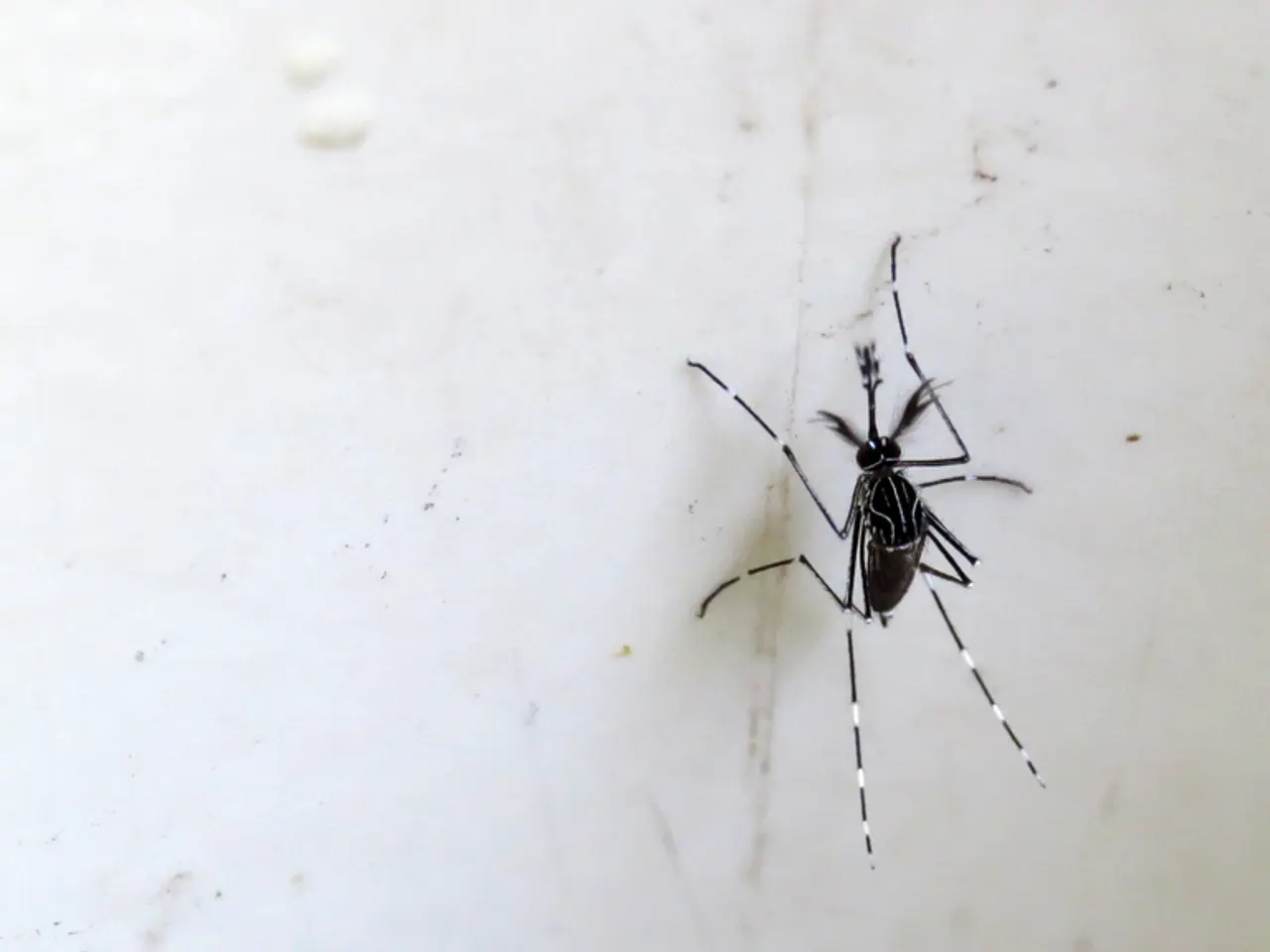Human instances of West Nile virus confirmed in Denver and Jefferson County during current season
In the heart of Colorado, the Denver Department of Public Health and Environment has confirmed the city's first human case of West Nile virus this season, prompting officials to urge residents to take necessary precautions to avoid being bitten by an infected mosquito. This alarming development comes amidst reports of increased infection rates in mosquitoes across the state, with West Nile virus found in eight of the 16 counties that have been tested in Colorado this year.
The West Nile infection rate in Fort Collins is currently 11 times higher than the historical average, posing a significant threat to the community. In fact, there has been at least one death due to West Nile virus in Colorado this year, underscoring the importance of taking preventive measures seriously.
West Nile virus symptoms include fatigue, fever, headaches, body aches, rashes, swollen lymph nodes, and usually appear within 3-14 days. Anyone experiencing these symptoms is advised to consult their healthcare provider immediately. It's important to note that while anyone can be infected, the risk of developing serious symptoms is higher for those over 50 or individuals with weakened immune systems.
To reduce the risk of West Nile virus infection, it is crucial to eliminate standing water where mosquitoes breed and to use effective mosquito repellents consistently.
Eliminating standing water:
- Remove or empty containers, buckets, flower pots, old tires, birdbaths, and other objects that can hold even small amounts of water at least once a week.
- Clean gutters regularly to prevent water accumulation.
- Treat water that cannot be drained (e.g., ponds or rain barrels) with Bti larvicide, a natural insect growth regulator that kills mosquito larvae safely.
- Be aware that even one small can of water can hold thousands of mosquito larvae, so thorough removal of standing water is important.
Using repellents and protective measures:
- Apply EPA-registered insect repellents containing one of these active ingredients: DEET, Picaridin, IR3535, Oil of lemon eucalyptus (OLE), Para-menthane-diol (PMD), or 2-undecanone. Always follow label instructions.
- When using both sunscreen and insect repellent, apply sunscreen first and then repellent.
- Wear long-sleeved shirts, long pants, and socks, especially during dawn and dusk when mosquitoes are most active.
- Cover babies with mosquito netting in strollers to protect them from bites.
- Limit outdoor activities during peak mosquito times (early morning and evening).
Additional local context highlights the importance for those over 55 or with pre-existing health conditions (like diabetes) to take extra precautions, as they are at higher risk of severe infection.
Following these steps—draining standing water weekly, using effective repellents, dressing protectively, and avoiding outdoor exposure at dawn and dusk—can significantly reduce your risk of West Nile virus infection in Colorado.
Stay informed and stay safe, Colorado. For the latest updates on West Nile virus and other public health concerns, tune in to our Colorado in Denver, where Christa Swanson brings you the latest news and advice to keep you and your family healthy. And remember, let's all do our part to keep Colorado mosquito-free!
[1] Colorado Department of Public Health and Environment. (2021). West Nile Virus. Retrieved from https://www.colorado.gov/cdphe/west-nile-virus [2] Colorado Department of Public Health and Environment. (2021). West Nile Virus: People at Higher Risk. Retrieved from https://www.colorado.gov/cdphe/west-nile-virus-people-higher-risk [3] Colorado Department of Public Health and Environment. (2021). West Nile Virus: Prevention. Retrieved from https://www.colorado.gov/cdphe/west-nile-virus-prevention [4] Colorado State University Extension. (2021). Mosquito Control. Retrieved from https://extension.colostate.edu/topic-areas/insects/mosquito-control-1376/ [5] Jefferson County Public Health. (2021). West Nile Virus. Retrieved from https://www.jeffco.us/departments/jefferson-county-public-health/disease-control/west-nile-virus
- In light of the increasing West Nile virus infection rates across Colorado and the first human case reported in Denver this season, it's essential to follow preventive measures to safeguard one's health.
- For those at higher risk, such as individuals over 55 years old or those with pre-existing health conditions like diabetes, taking extra precautions like draining standing water weekly and avoiding outdoor activities during peak mosquito times is crucial to prevent severe infections.
- To reduce the risk of West Nile virus infection effectively, it's recommended to follow a comprehensive approach by draining standing water, using EPA-registered insect repellents containing active ingredients like DEET or Picaridin, dressing protectively, and minimizing outdoor activities during dawn and dusk when mosquitoes are most active.




